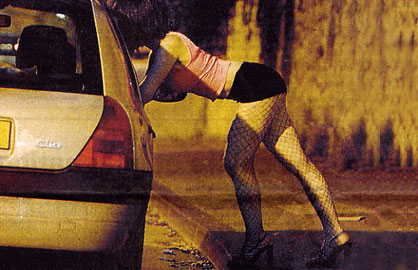
So much could be written about the institution of prostitution, but here I only write down a few ideas that might open the eyes of those who see nothing wrong with making light of prostitution (calling it humour) and giving playful and fun advice to men for when they go “whoring,” as “Shazde Asdola Mirza” puts it in his “fiction.”
http://iranian.com/main/2011/mar-37
Prostitution is against women’s human rights!
In most cases around the world, prostitution is not a conscious and calculated choice. Most women who become prostitutes do so because of extreme poverty and lack of opportunity, or of serious underlying problems such as drug addiction, past trauma (especially child sexual abuse) and other unfortunate circumstances. Or they were forced or coerced by a pimp or by human trafficking. If prostitution is a free choice, why are the women with the fewest choices the ones most often found doing it?
In prostitution, women have sex with men they would never otherwise have sex with. The money thus acts as a form of force, not as a measure of consent. It acts like physical force does in rape.
Some prostitution scholars hold that true consent in prostitution is impossible: “In the academic literature on prostitution there are very few authors who argue that valid consent to prostitution is possible. Most suggest that consent to prostitution is impossible or at least unlikely.”( Barbara Sullivan, Rethinking Prostitution and “Consent”, 1995, in Caine, B. & Pringler, R. (eds.) Transitions . Allen & Unwin: Sydney.)
No person can be said to truly consent to their own oppression and no people should have the right to consent to the oppression of others. In the words of Kathleen Barry, consent is not a “good divining rod as to the existence of oppression, and consent to violation is a fact of oppression. Oppression cannot effectively be gauged according to the degree of “consent,” since even in slavery there was some consent, if consent is defined as inability to see, or feel any alternative.”( Barry, K “The Prostitution of Sexuality: The Global Exploitation of Women”. 1995. New York: NYU Press.)
Sexual liberation for women is extremely important in the fight for gender equality, but it is crucial that society does not replace one patriarchal view on female sexuality—e.g., that women should not have sex outside marriage/a relationship, that casual sex is shameful for a woman etc.—with another similarly oppressive and patriarchal view—prostitution, a sexual practice which is based on a highly patriarchal construct of sexuality: that the sexual pleasure of a woman is irrelevant, that her only role during sex is to submit to the man’s sexual demands, and to do what he tells her, that sex should be controlled by the man and that the woman’s response and satisfaction are irrelevant. Sexual liberation for women cannot be achieved as long as we normalize unequal sexual practices where a man dominates a woman.
Prostitution is a form of male dominance over women. In the act of prostitution, the client has sex with a woman who does not enjoy it and who is making a tremendous psychological effort to mentally dissociate herself from the client. It is not a mutual and equal sex act, as it puts the woman in a subordinate position, reducing her to a mere instrument of sexual pleasure for the client. Many clients use the services of the prostitutes because they enjoy the “power trip” they derive from the act and the control they have over the woman during the sexual activity. Prostitution isn’t sex only, it’s you do what I say, sex.
Prostitution is a practice which leads to serious negative long term effects for the prostitutes, such as severe trauma, stress, depression, anxiety, self-medication through alcohol and drug abuse, eating disorders and a greater risk for self-harm and suicide, as prostitution is an exploitative practice, which involves a woman who has sex with customers to whom she is not attracted, and which also routinely exposes the women to psychological, physical and sexual violence.
Prostitution reinforces the idea that women are sex objects which exist for men’s enjoyment, which can be “bought” and which can be “used” solely for men’s sexual gratification. When a society accepts prostitution, it sends the message that it is irrelevant how the woman feels during sex or what the consequences of sex will be for her, and that it is acceptable for a man to engage in sexual activity with a woman who does not enjoy it and who is mentally and emotionally forcing herself in order to be able to cope. It is very much like the husband and wife relationship within a practicing Muslim family that follows the Sharia Law.
Although the normalization of such one sided sexual encounters might negatively affect the way men relate to women in general and might increase sexual violence against women, I do believe in decriminalization of prostitution – not its legalization. Legalization is a messy way to go about protecting prostitutes. Legalization has led to more black market prostitution and child prostitution. It does not work. Research has proven to be much more effective if we simply decriminalize it. That way, women can work for themselves and are not under the tyranny of pimps (or “entrepreneurs” as they are called when legalized).
Decriminalization of prostitution needs a separate blog and discussion.
Azadeh






